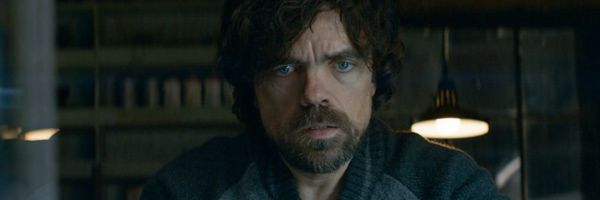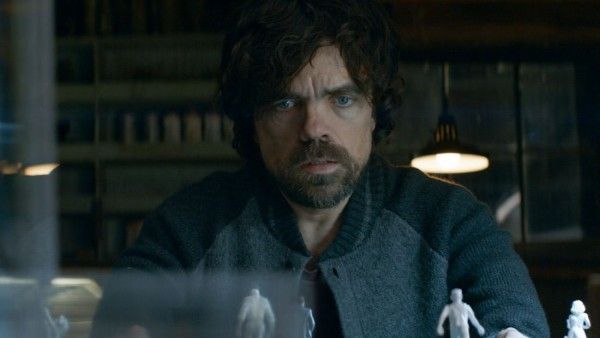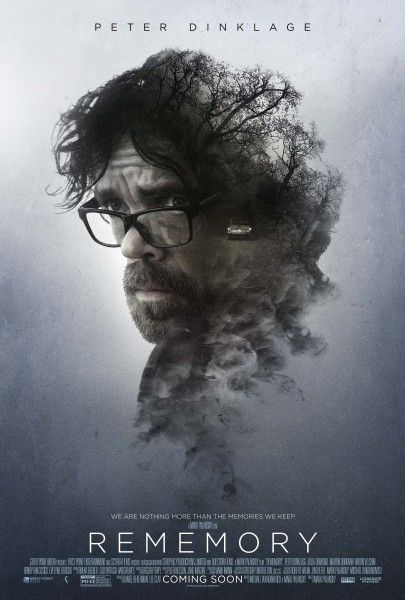From director/co-writer Mark Palansky, the dramatic mystery Rememory explores the unexplained death of visionary scientific pioneer Gordon Dunn (Martin Donovan). With everybody searching for the device he’s invented – which has the ability to extract, record and play a person’s memories – a mysterious man (Peter Dinklage) with questionable motives successfully tracks down the machine and uses it to try to figure out who’s responsible for what’s happened, even if it sends him straight into his own memories.
During this 1-on-1 phone interview with Collider, filmmaker Mark Palansky talked about how the idea for Rememory evolved, why Peter Dinklage was the right actor to tell this story, Anton Yelchin’s work in the film, what he kept from the shoot, whether the finished product is close to what he originally envisioned, why it took him so long to make another film after Penelope, directing episodes of Lemony Snicket’s A Series of Unfortunate Events, and what’s next for him.
Collider: How did Rememory come about? Was it out of a desire to delve deeper into the concept of memory exploration, or did something else spark the idea?
MARK PALANSKY: This kind of stuff fascinates me. I think I’m pretty introspective and constantly think about heavy shit that I probably shouldn’t, and it grew from that. I was born in Canada, and my family moved when I was 7 to California. Where I grew up in L.A. just looked like E.T.-ville, in the suburbs. I remember, as a child, burying a hammer on the side of my house. I could go back to that house today and dig up that hammer, but I don’t remember what happened before that or after that. It’s just a funny, odd memory because it seems like I either just killed a cat or I built a birdhouse. I don’t know what the heck happened. So, I’m fascinated by the idea that certain memories seem crisp while so many others fall away. That led me on this train of that where, if you could stand in the space of your past, as an adult, you would very quickly realize that how you remember most things would change. At that point, when I came up with the concept, I hadn’t done any research on memory and I didn’t know that our memories are completely flawed and inaccurate. I just knew that these things that you hold so tightly are the definition of who you are, as an adult, are probably based in how you’ve written your own narrative and not reality. We wrote stuff down around that idea, and then the machine came from this place of, if everything we remember is inaccurate, for the most part, and it’s pretty much scientific fact that our memories are completely flawed, you would need this machine to show you the actual truth of what your past was. That’s where it all began. And then, once I had enough down in a journal about those themes and the road map, that’s when I called [Peter] Dinklage and said, “I think I’m gonna write something for you. Do you wanna do it?” At that point, it was just scribbles on a page. Peter and I had dinner one night and I walked him through some of this, and he gave me memories about his father and some trips they took, as a family, when he was younger, that made it into the film. And then, I brought my friend, Michael Vukadinovich, who’s an amazing writer, on to make sense of all of my crap.
Why was Peter Dinklage the right actor to tell this story?
PALANSKY: I just love him. There’s another project that we’ve both been attached to for several years now, long before Rememory. I’m most attracted to people with integrity and real strong senses of who they are. Peter has never given a shit about any of the noise that most of Hollywood or entertainment is preoccupied with. He’s never cared about that, and he’s never been a part of it. He’s just about the work, the piece itself, and what he can bring to it. His art is quiet, and that, to me, is the best art. The way he performs and how he delivers things is amazing. Even in the script phase, we were aware of the ask of the audience, to go along with a character you know very little about and who’s basically a completely unreliable narrator. This needed a real soul and it needed an actor who you will go along with, even though you don’t know what his agenda is, and that’s Peter. He’s just so talented and he’s such a beautiful person that I want him to be the lead actor in movies. I want to watch movies with just Peter Dinklage. If I’m going to sit through a two-hour movie, I want Peter to be in most of it and I don’t want to have to wait for his scenes to pop back up. I don’t watch Game of Thrones, and I’m probably going to get hate mail from Collider’s readers, but it’s for no other reason, other than I feel like I’ve gotten behind already now and it’s a daunting task. Once it’s all over, I’ll watch it as a complete set.
This film is also some of the last work that we’ll get to see from Anton Yelchin. How did you find the experience of working with him?
PALANSKY: My co-writer on this has written a script, called Pete and Goat, that I was gonna do a few years ago, and Anton was my first choice for that. We sent it to him, and within three days, he read it and loved it. I met with him within a week of sending it to him, so he was attached to that. He and I got to know each other, around that time. We had dinner and went out a few times, and he was such a great presence. He wasn’t too cool for school. He just loved so many different things and was passionate about so many different things that he was always just really fun and funny to be around. And then, when it came time to cast Todd in this, I thought of Anton because there’s a real sweetness to him. Todd is a pretty disturbed character, and I think it’s always much more interesting, if you zig when you’re supposed to zag, and Anton brought it. When he came to set, I hadn’t seen him in awhile, and he was in Todd mode already. I didn’t realize it, at the time, until he was finished filming his heavy scenes, and then he was back to being the Anton I had known previously. He was just in it. He was intense and he came prepared for that part. Some actors, in between takes, are still in it with the whole method thing, and some aren’t. He definitely was in disturbed, post-traumatic stress disorder Todd mode during filming. And then, the weekend after we filmed that stuff, me, him and Peter went out for sushi and he was hilarious. He just had us both cracking up. It’s still such a weird, horrible, surreal place to be in. It’s obviously a serious role and it’s something that he took seriously, so it’s good that one of his last is something that he cared about.
What happened with the model structure that Sam Bloom built? Did you really throw it into the water, or did you take it home?
PALANSKY: I haven’t been asked that question! He actually threw a rock in the wide shot. The model, itself, we shot in a pool. It got pulled back out, but it was water-logged and not looking as good as it once did. It was funny, it wouldn’t sink, at all. We had to put this 300-pound iron plate on the bottom of it. When we were shooting it, we were a very small movie, so it was basically me and Peter, and an underwater camera and our D.P. There was so much fear about that iron plate. Peter basically had to throw that in the water and it weighed a ton. He had to pick it up the second before we were shooting because it weighed so much, and we were concerned about it slicing through the water and decapitating our D.P. It actually still floated on the surface of the water. It was a really weird lesson in how boats float. It didn’t sink to the bottom, at all. So, I don’t know where that model is now. I’ve got some things from the film, but I didn’t keep that model.
What did you keep?
PALANSKY: I may have the rememory machine, and Gordon’s memory and Sam’s memory. It’s a great party prop when you have people over. Everyone loves it, but it can get awkward if you see things you shouldn’t see. We only had one of those machines. We didn’t have the budget to create six of them, so we had one really finicky prop. I had to travel back with it, through airport security, and I kept expecting to get quarantined because it was in that metal briefcase, which seemed pretty shady.
From what you thought this movie might be when you set out on this whole journey, how different did it ultimately all turn out and what are you most proud of having been able to accomplish with it?
PALANSKY: I think the film is what I set out to make. It was always an emotional drama wrapped in the guise of a mystery. Obviously, there is a mystery element to the story, but in the end, the mystery is not what you think it is. I’m proud of Peter and his performance. I’m proud that the film is standing on his shoulders. I don’t think that’s been done since The Station Agent, and I hope it creates more space for Peter to be a lead in films because he’s so incredible. I don’t set out for a film to say anything specific to people, but I like films that make you talk about them and discuss them afterwards. The worst thing is to walk out of the movies and just go straight to grab a slice of pizza, and never think or talk about it again. My hope would be that people see this and are engaged in whether they would want to use the machine or not. Those kinds of questions will be cool to come up, after seeing this film. But the film does feel how I hoped it would, even from the initial concept. You can’t help but have a deep emotional connection to your past and the memories you hold onto, and what, why and how you hold onto specific ones. Ultimately, this film is quite an emotional journey.
If there were no side effects, would you take the risk of using a memory machine like this?
PALANSKY: Throughout the process, we would have little screenings for notes and, every single time, it was pretty divided on whether people would use the machine or not. A lot of people said they wouldn’t want it near them. People don’t want to see how they were really treated. You go to your negative memories. When he was asked, even Dinklage was like, “No, I don’t need to go back to those times.” But, I would definitely consider it. I don’t think about wanting to use it to re-experience pivotal moments in my life. I think about going back to get in the space of where I was, at that time, rather than the specifics of a memory. Side effects not withstanding, I’m sure this machine will exist, at some point in time. I’m curious to see what it would do to people.
I loved Penelope, but that film came out a number of years ago. Will you direct your next movie sooner than that?
PALANSKY: A lot of funny things happened, and I want take you through the trials and tribulations of that. Penelope built a lot of bridges that I didn’t want to cross. Rememory is much closer to me, as a filmmaker and thematically. After Penelope, people were like, “You can do rom-coms and kid’s fantasy films,” but to me, Penelope was a disfigured girl who couldn’t leave her house. That’s what the core of that movie is. I know it’s obviously wrapped in this candy-colored shell. I just didn’t want to do that sort of stuff. I had to figure out my way out from what that situation was. So, I’ve got something else with Dinklage that’s called Jester, that’s based on an Edgar Allan Poe short story, that we’ve had for awhile. If he would ever finish this little TV show that he’s on, he’d have some time to do things. I’m also writing another feature right now with Mike, who I wrote Rememory with. I’m certainly hoping that I’ll be back at it much quicker, this time around, but you never know. I had final cut on Rememory and full creative control, which I did not have on Penelope, and that’s a big thing. If I can make another feature sooner rather than later, I’m hoping it’s in the same way of being able to fully have control over it.
You also did some work on A Series of Unfortunate Events. How did you find the experience of directing episodes of that show?
PALANSKY: It was two hours of material, and I think we had more days to shoot that than we did Rememory. My set on Lemony Snicket, and not even all of the other amazing sets, was well over the cost of Rememory. It was a very different experience.
Have you thought about either returning to direct episodes for Season 2, or directing episodes of another TV show?
PALANSKY: Yeah, I have a TV thing, as well. The first feature I ever wrote, Darren Aronofsky’s company Protozoa was producing a few years ago, and we got it back and reconceived it as a 10-hour TV thing. I hope to get that up and running, as well. It’s a psychological story that’s dark and really cool. When I first wrote it, it had a sci-fi hook, but now, technology has come to a place where the story is not really sci-fi anymore, which is amazing. It’s only gotten more insane, in terms of people’s voyeurism and access to watching people’s lives. It’s in that mix.
Rememory is in theaters and on Google Play.



